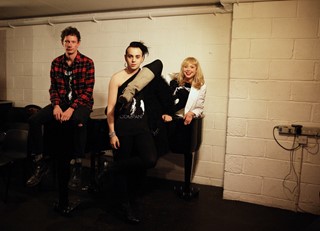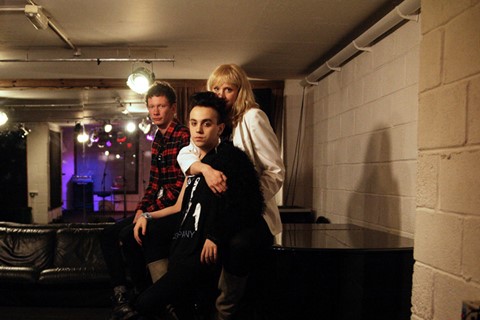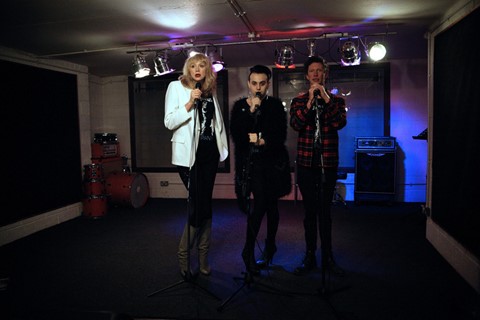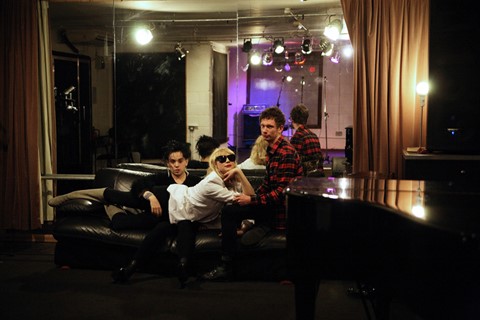The Theo Adams Company combine references as diverse as classical opera, reality television, high camp and greek tragedy. Directed by self-taught Theo himself, the company brings together performers from a vast array of disciplines to produce often
The Theo Adams Company combine references as diverse as classical opera, reality television, high camp and Greek tragedy. Directed by the self-taught Adams, the company brings together performers from a vast array of disciplines to produce often overwhelming productions that cut through the boundaries of stage play and performance art.
Heralded as an invigorating addition to London's alternative scene, Adams has provided a meeting point for leftfield performers that gives them a platform to express aspects of their creativity, perhaps otherwise not given an outlet.
Their forthcoming Cry Out piece, which will be debuted in the UK at London's ICA after being shown as part of a larger work created in conjunction with Louis Vuitton in Japan, puts all of Adams' notorious elements into one grand spectacle. We sat down with Theo, set designer, David White, and actress, Gwendoline Christie, to discuss the power and importance of spectacle today.
Throughout the work of the company there is often a central theme surrounding the idea of spectacle. What is it about that aesthetic you find interesting?
Theo Adams: I think if someone is going to pay to see a show, you should put on a show. It is that very basic, old, idea of theatrics.
Gwendoline Christie: You want a heightened version of life. Spectacle takes all the heady aspects of life, so you get one big hit of how you would like life to be.
David White: I think the building of that spectacle is essentially important as well, the crescendo of the work.
GC: I found it hard to be open about my love of high drama when I was younger. I loved John Cassavetes' films, Bob Fosse and Liza Minnelli. I loved women who were exaggerated in their femininity. It was actually quite amazing when I found Theo and the Company — that they were all also so interested in discussing that through the work, without it being seen as substanceless.
TA: I always think it's amazing that I was able to find so many people who see this idea of a grande performance as important. I don't think any of us are into spectacle for spectacle's sake. We use it as a tool. When I'm doing this it doesn't feel odd, or different to anything anyone else is doing. It's just what we like. It's really that basic.
GC: But that's it. It has always been the case that those outside the boundaries of society group together. Because we are seen differently, dress differently, represent our gender differently. Its very basic psychology. You feel excluded and oppressed, and that makes you want to express.
DW: It's an honest expression, and one that has passion and direction behind it, beyond just being entertainment.
TA: It's really interesting that as a director I have been able to find the cast without auditioning. I cast each of them because of who they are. Everyone's personality is essential, and I want them to retain that on stage.
GC: There is one part of this performance, a monologue we have pulled together from various scripts, films and diaries, that expresses so closely who I am, that I think it is the most honest work I have done as an actress. I very rarely express those parts of me to my friends, so to do so in a public arena is incredibly cathartic.
This exaggerated way of showing who you are through these performances has a long lineage in stage history. Is that something that you are aware of?
TA: For this performance we actually combine Casta Diva and Diva by Beyoncé. It wasn’t a conscious thing to bring those two worlds together, but in a way that is what we are doing, continuing that lineage by bringing it up to date.
GA: There is not a particular concept we are trying to drive through the work. I don't think anyone enjoys it when they feel like they are being hit over the head with a message by their art.
TA: It's about simply coming and seeing a performance, experiencing it, then going away and working it out. Two people can have two very different responses.
GC: Yes well, I think that is something we never have to worry about. There always tends to be a strong response of some kind to our shows!
TA: I've never had a mediocre review in my life. They are either terrible or brilliant.
GC: But that's exactly what you want. Give me the full fucking five, or don't give me any at all.
TA: It's the same in life, people either like you or they don't, so I never make a performance with whether or not the audience are going to like it in mind.
GC: That's the same with any form of honest art. I have been in performances where the team has tried to put together elements that they feel are winning, and in the end, it just seems heartless.
TA: Yes but there are tools of manipulation that I am very happy to use. Look at reality television. A lot of people see reality TV as trash, but I think a lot of it is genius, and not in an ironic way; genius in the manipulation of the audience. The use of music, the use of editing, and as David mentioned earlier, crescendo.
GC: David, do you love the X Factor?
TA: Oh Gwendoline, come on, he doesn't have a TV.
DW: Love is a strong word.
GC: I was up until 3am last night just watching clips on youtube, forming opinions about the contestants simply based on how they are being represented to me. And then I would watch a different set of clips and form an entirely different opinion. It is incredibly clever.
TA: I actually think that X Factor is one of the best pieces of art of the 21st century.
GC: I agree. Simon Cowell is a genius. It's so interesting watching the way they strip away any form of personality from the contestants. Cher, for instance, started with something, an incredible attitude. I would watch her and be hooked on it. As time has gone on you see her become nothing but the husk of a sixteen-year-old girl, floating on a staircase in the middle of an empty stage. Her mentor smiling away. It's the same with Rebecca. There was a girl that could really sing, but they have transformed her into what looks like an outdated transvestite, with huge earrings and a Wallis suit. Drained of all heart and soul.
DW: It's like the judges locking away their personality.
GC: I mean fucking hell, put it in a gallery.
Reality television is definitely a form of escapism, do you want your work to be seen as that?
TA: I don’t think its something that is very conscious, but when people talk about the work it is something that is often mentioned. I think that could be because a lot of people lead quite dreary lives, and we're showing them what it could be like!
GC: Amazing. That is so incredibly snobbish, I love it.
Theo Adams Company: Cry Out at the ICA, London on 18-19 December 2010.



